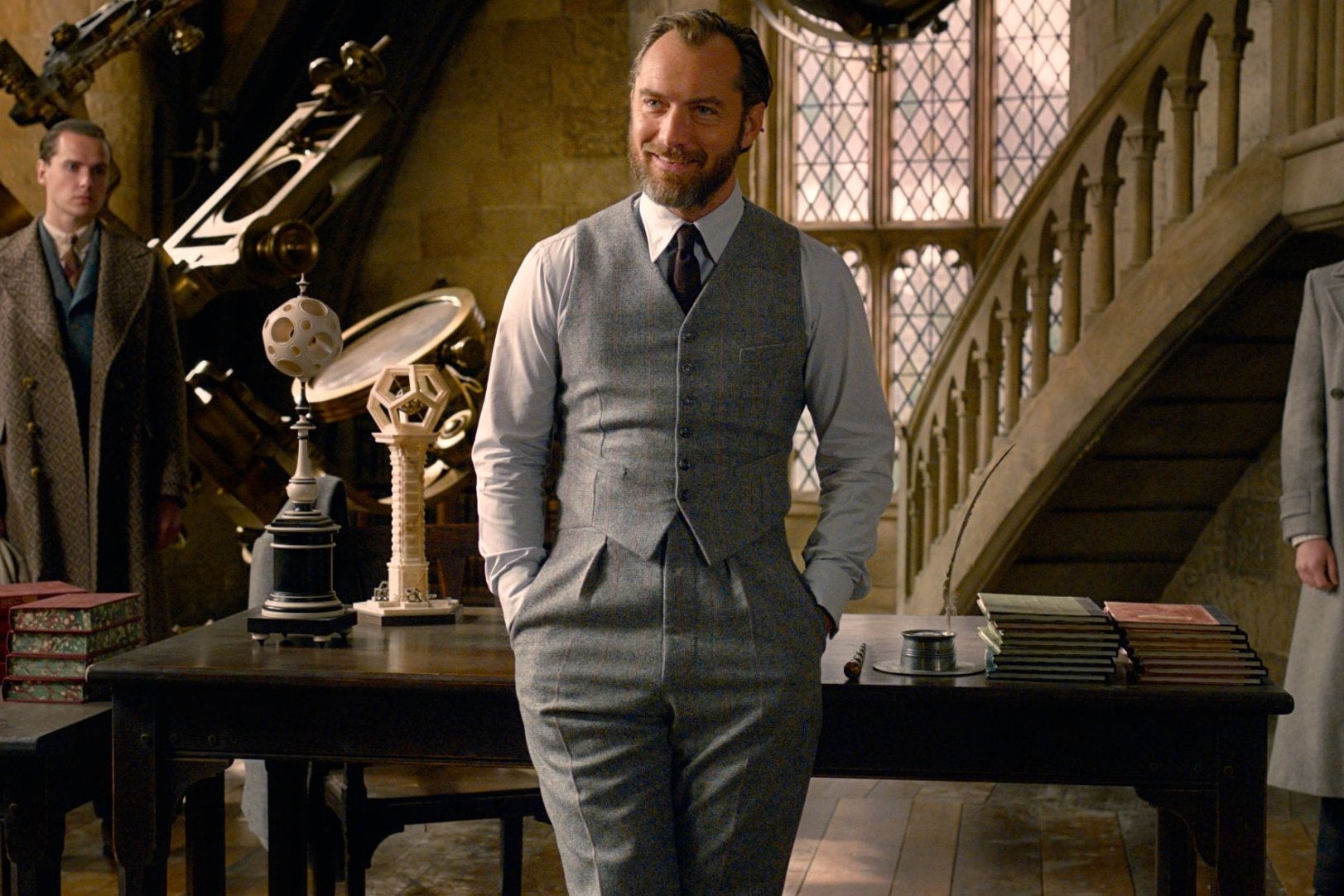Fantastic Beasts: Is retconning damaging cinema?
When creators start to change aspects of an established universe, it can damage the relationship with its audience, writes Clarisse Loughrey


Your support helps us to tell the story
From reproductive rights to climate change to Big Tech, The Independent is on the ground when the story is developing. Whether it's investigating the financials of Elon Musk's pro-Trump PAC or producing our latest documentary, 'The A Word', which shines a light on the American women fighting for reproductive rights, we know how important it is to parse out the facts from the messaging.
At such a critical moment in US history, we need reporters on the ground. Your donation allows us to keep sending journalists to speak to both sides of the story.
The Independent is trusted by Americans across the entire political spectrum. And unlike many other quality news outlets, we choose not to lock Americans out of our reporting and analysis with paywalls. We believe quality journalism should be available to everyone, paid for by those who can afford it.
Your support makes all the difference.Fantastic Beasts: The Crimes of Grindelwald has a big promise to fulfil in the eyes of many. Three months after the final Potter book, The Deathly Hallows, was published, author JK Rowling revealed to fans that she had “always thought of Dumbledore as gay”, despite there being no mention of his sexuality in any of the books.
Not only that, but Gellert Grindelwald, played in the film by Johnny Depp, is the man Rowling described as the great love of Dumbledore’s life. Was this the moment that Rowling was about to make good on her comments? Unfortunately, no. The film does tell the story of Jude Law’s Dumbledore’s intense relationship with Grindelwald, but as is often the case with LGBT+ characters in Hollywood, his sexuality is left to subtext.
It’s a case of retconning gone wrong. The term, also known as “retroactive continuity”, describes when a creator revises an established aspect of their work. Everything you thought you knew can change. And so, Rowling had simply retconned Dumbledore’s backstory: he was gay all along; it was just never mentioned before. Retconning, though, can also mean completely rewriting things that you have already seen on screen. It has happened to Star Wars, Mad Max and Halloween.
Sometimes it can breathe new life into a franchise but, as in Rowling’s case, it can also arguably do more harm than good. Although the revelation was initially praised as a push for inclusivity, Rowling has now left fans in a position where they actively have to reinterpret the work in order to find the subtext they needed, simply because she said so.
This isn’t the only controversial change Rowling has made to her Wizarding World, as The Crimes of Grindelwald reveals that Nagini, Lord Voldemort’s serpent companion is, in fact, a woman, played by Claudia Kim. More specifically, she is a Maledictus, meaning a human that can transform into an animal, but is cursed to one day remain in an animal state. Many fans reacted with curiosity, and even excitement, but accusations of short-sightedness were quick to surface.
Kim’s involvement does add some much-needed diversity to the Wizarding World, but why had a South Korean actor been cast as Nagini, since the name has strong associations with the Indian language of Sanskrit? Add to that, the character is uncomfortably reminiscent of how Asian women are stereotyped, either as subservient to men (in her later role as Voldemort’s pet) or as a “dragon lady” type (quite literally here).
There’s a case to be made here that Rowling’s rush to up the diversity of her Wizarding World is not only a series of token gestures that add no significant meaning to the original work, but actually weakens the universe itself, by suggesting it exists in a constant state of flux. Should a creator really demand that their fans be willing to alter their understanding of a work at the drop of a hat, merely because they say so?
The practice has a long history – Arthur Conan Doyle famously retconned his Sherlock Holmes stories so the detective could survive his plummet off the Reichenbach Falls – but the term itself originates from the DC comic All-Star Squadron when, in an issue from February 1983, writer Roy Thomas responded to a letter from a fan.
The comic was set in an alternate universe called Earth-Two, created by DC Comics to allow their superheroes to age in real time, while also offering an opportunity to fix continuity errors and reshape several origin stories. When questioned on it, Thomas said they had begun to call their approach “retroactive continuity”, adding: “Has kind of a ring to it, don’t you think?”
The term quickly gained popularity in the comics world, since the need to supply a consistent stream of stories about one character, often over the course of several decades, requires drastic (and frequent) reinvention. Because of this, retconning is an accepted part of the comics community. The same can’t be said of film. Rowling’s dubious relationship with the practice also happens to be shared by her compatriot in gargantuan cultural influence: George Lucas.
The history of Star Wars and its retcons is a little more complex. Some are a proven example of how retcons can become an accepted part of the canon, with fans compliant in erasing any inconsistencies. In A New Hope (1977), Obi-Wan Kenobi (Alec Guinness) tells Luke Skywalker (Mark Hamill) that his father, Anakin, was betrayed and killed by Darth Vader.
However, as we all know, Darth Vader reveals himself as Luke’s father in The Empire Strikes Back (1980). Darth Vader and Anakin were originally meant to be two separate characters, but Lucas decided to merge them for narrative convenience, telling fans that Obi-Wan’s description was still right from “a certain point of view”, since Anakin was essentially dead in the Jedi master’s eyes.
For the most part, the changed was accepted, since the dramatic payoff was so satisfying. The same can be said for the fact Luke and Leia (Carrie Fisher) kiss several times, before the two are revealed to be twins – Lucas similarly intended Luke’s sister to be a separate character, before merging her with Leia. Jokes aside, fans have simply assumed the pair stumbled into a little unintentional incest.
The trouble starts with the Special Edition releases of 1997, now infamous for its retcons. Particularly, the change to the encounter between Han Solo (Harrison Ford) and the bounty hunter Greedo (Larry Ward). In the original film, it’s Han that shoots first, but an edit to the scene saw Greedo shoot first and miss, with Han retaliating. It’s been a major sore point for the fandom ever since.
There is a clear difference here: his earlier changes were signalled by dramatic necessity, enacted before the films had an opportunity to solidify into cultural icons, while his meddlings in the Special Edition only served to undermine established belief.
Indeed, dramatic necessity is arguably the only instance in which retconning actually works for audiences. Take, for example, the contradiction in the DC Extended Universe. In Batman v Superman (2016), Wonder Woman (Gal Gadot) mournfully declares: “A hundred years ago, I walked away from mankind.” Yet, that hardly fits the hopeful image we see in Wonder Woman (2017)’s final moments, as she vows to stay and fight for “the world I know can be”, with her heroics set to continue in Wonder Woman 1984.
As Gadot has explained, the character’s backstory wasn’t established in her first appearance, and during production on her solo film: “we started to dig in and understand the core of the character, we realized that actually there is no way that Wonder Woman will ever give up on mankind.”
Wonder Woman turned out to be a box office smash that gave hope to a floundering DC Extended Universe, but a very fine line exists between dramatic necessity and a desperate cash grab. This is, unsurprisingly, evident in the Transformers franchise, which has retconned the origins of the Autobots with wild abandon, adding sudden appearances during major world events, including the building of the Pyramids of Giza and the Second World War, motivated only by the desire to keep the franchise going as long as possible.

It’s a similar approach often adopted by the slasher genre, as sequels will be retconned with increasingly ludicrous reasons for the killer’s survival. Jason Voorhees has made several miraculous returns over the course of the Friday the 13th franchise, for example.
Retcons can also act, however, as a kind of compromise, allowing films to continue trading on a recognised name, while essentially wiping the slate clean in order to achieve creative freedom. George Miller’s Mad Max: Fury Road (2015) is still technically a sequel to Beyond Thunderdome (1985), but ignores much of the continuity of the original timeline, most obviously by replacing Mel Gibson in the role of Max with Tom Hardy, making the character much younger than he should be.
Star Trek (2009) created its own alternate timeline. This year’s Halloween, meanwhile, ignored every sequel in the franchise, including the revelation Michael Myers is the brother of protagonist Laurie Strode (Jamie Lee Curtis), instead serving as a direct follow-up to the 1978 original.
By separating itself from what had come before, instead of writing over it, the new Halloween could offer new creative pathways without destroying the audience’s attachment to the old. It was a decision, once again, that served dramatic necessity in order for the franchise to survive. And it worked: the film made $246m at the global box office, making it the highest-grossing of the franchise.
Our art is driven by the impulse for more: more money, more ideas, more opportunities to get things right. We struggle to make peace with our past. Maybe it was too much to expect JK Rowling, stood before the empire she built, simply to leave Harry Potter behind. Maybe it goes against human nature.
In the end, Fantastic Beasts is too much of a cultural titan to be felled merely by a few retcons, but these actions do affect the relationship between creator and audience – bringing either new life to the world they’ve shared or weakening its foundations.
Fantastic Beasts: The Crimes of Grindelwald is released in UK cinemas on 16 November
Join our commenting forum
Join thought-provoking conversations, follow other Independent readers and see their replies
Comments